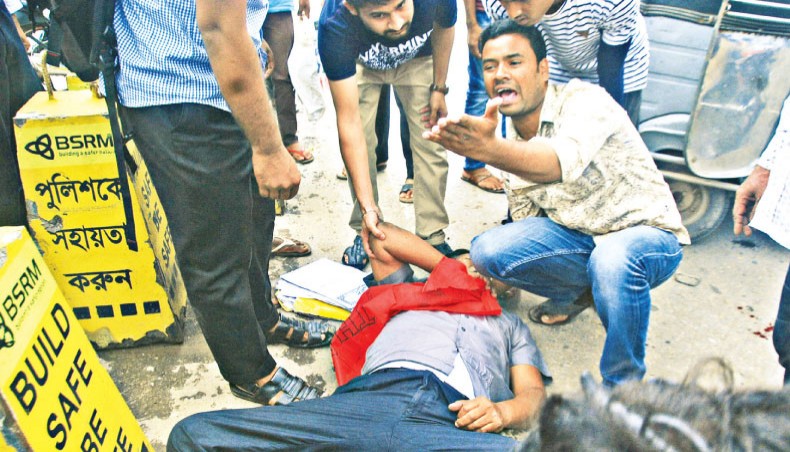Road safety goes awry
Road safety recommendations of National Road Safety Council have largely been ignored for years on end amid repeated incidents of fatal accidents on roads and highways across the country.
Criticising the council for failing to implement the recommendations, experts and civil society representatives have blamed nexus among government officials and transport operators allowing movement of unfit vehicles, reckless and unskilled drivers, culture of impunity and corruption for the existing anarchy on roads.
Years after years, the NRSC recommendations for being more judicious in giving fitness certificates and registrations, increasing training for drivers and bringing responsible drivers, owners, engineers and fitness authorities under law have been overlooked at the cost of many innocent lives, they say.
The loss of forearm and death of student Rajib Hossain on April 3 for the mindless competition of two reckless buses in the capital and loss of arm of a transport worker in a truck-bus accident in Gopalganj on April 17 are just two of many incidents across the country.
The High Court Division on April 4 directed the government to explain why it would not be asked to ensure safety of passengers by controlling reckless driving and strict enforcement of traffic rules.
The government was also directed to explain why it would not be asked to stop road accidents to ensure passengers’ safety.
According to Bangladesh Road Transport Authority, 56,410 vehicles, including 3,740 belonging to different ministries and government agencies, have not had their fitness certificates renewed for more than a decade.
On Saturday, Passenger Welfare Association of Bangladesh published a report saying that between January 1 and April 20 this year 1,841 people were killed and 5,477 more injured in 1,779 road accidents across the country.
It also shows that capital’s 87 per cent public buses and minibuses are defying traffic rules.
National Human Rights Commission of Bangladesh chairman Kazi Reazul Hoque told New Age that anarchy ruled the road sector due to movement of unfit vehicles, unskilled drivers’ reckless driving and lack of accountability to law.
Writer Syed Abul Maksud, also a member of the civil society representatives of NRSC, observes that the entire road transport sector is in the grip of massive corruption.
‘When ministers are the leaders of both transport owners and workers’ associations, how will the government secure the interest of people before securing the interests of owners and workers?’ he asked.
At present shipping minister Shajahan Khan is also the executive president of Bangladesh Sarak Paribahan Sramik Federation and state minister for local government while rural development and cooperatives Moshiur Rahman Ranga is also the executive president of Bangladesh Road Transport Owners Association.
The shipping minister in August 2011, a few days after filmmaker Tareque Masud and cinematographer Mishuk Munier died as a bus rammed into their microbus in Manikganj, said that anyone able to recognise ‘cows and goats on the road’ could hold a driving licence.
The NRSC was established in 1995 to take policy level safety-related decisions, action plans, give directives to road safety-related stakeholders and monitor these.
The 25th and last council meeting was held on November 12, 2017.
At the 24th meeting, held on January 12, 2016, toad transport and bridges minister Obaidul Quader had admitted that the district road safety council committees remained inoperative.
In 2011, a committee was formed under the council which submitted 52 short-term recommendations on road safety including appointment letter and fixed work hours for workers, no leasing out of public transports, awareness of traffic rules, strict maintenance of driving licence and fitness certificate procedures, training for drivers and strict implementation of traffic rules.
Bangladesh University of Engineering and Technology’s civil engineering department professor Md Shamsul Hoque alleged that currently the NRSC, the apex body on road safety, was very much far from its actual objective.
At the council meetings, discussions on congestion ate up most of the time while safety-related issues drew less attention, alleged Shamsul, also a member of the council.
Ekram Ahmed, convener of Family United against Road Accident and another member of the council, venting his disappointment, said that for the past nine years they were demanding implementation of the recommendations.
‘Without comprehensive and stern actions before it is too late, the anarchy in the transport sector will spare none,’ he warned.
Road Transport and Highways Division secretary Md Nazrul Islam told New Age Friday that owners and workers were also responsible for implementing these recommendations.
At present everyone was blaming each other, he said.
Dhaka Road Transport Owners Association president Abul Kalam said it would take time to implement the recommendations for ensuring salary structures and fixed work hours for workers.
News Courtesy:www.newagebd.net











